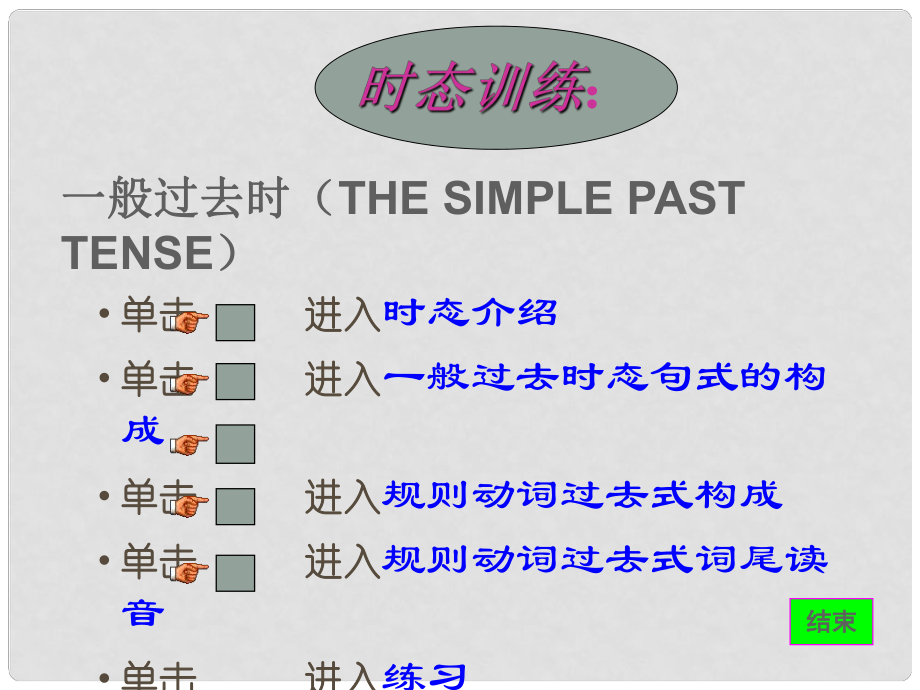《福建省廈門市思明區(qū)東埔學(xué)校初中英語 時(shí)態(tài)訓(xùn)練課件 人教新目標(biāo)版》由會(huì)員分享���,可在線閱讀��,更多相關(guān)《福建省廈門市思明區(qū)東埔學(xué)校初中英語 時(shí)態(tài)訓(xùn)練課件 人教新目標(biāo)版(14頁珍藏版)》請(qǐng)?jiān)谘b配圖網(wǎng)上搜索�。
1�、一般過去時(shí)(一般過去時(shí)(THE SIMPLE PAST TENSE) 單擊單擊 進(jìn)入進(jìn)入時(shí)態(tài)介紹 單擊單擊 進(jìn)入進(jìn)入一般過去時(shí)態(tài)句式的構(gòu)成 單擊單擊 進(jìn)入進(jìn)入規(guī)則動(dòng)詞過去式構(gòu)成 單擊單擊 進(jìn)入進(jìn)入規(guī)則動(dòng)詞過去式詞尾讀音 單擊單擊 進(jìn)入進(jìn)入練習(xí)結(jié)束結(jié)束:1.定義定義: 一般過去時(shí)態(tài)表示過去某個(gè)時(shí)間發(fā)生的動(dòng)作或存一般過去時(shí)態(tài)表示過去某個(gè)時(shí)間發(fā)生的動(dòng)作或存 在的狀態(tài),常和表示過去的時(shí)間狀語連用�;也表示過去在的狀態(tài),常和表示過去的時(shí)間狀語連用��;也表示過去經(jīng)?�;蚍磸?fù)發(fā)生的動(dòng)作,常和表示頻度的時(shí)間狀語連用��。經(jīng)?����;蚍磸?fù)發(fā)生的動(dòng)作���,常和表示頻度的時(shí)間狀語連用����。2.時(shí)間狀語時(shí)間狀語:yesterdaylast
2�、nightin 1990two days ago 等等3.頻度副詞頻度副詞:oftenalways 等等4.例句例句:I got up at 7:00 yesterday.My father was at work yesterday afternoon.He always went to work by bus last year. 返回首頁返回首頁巧記時(shí)態(tài)巧記時(shí)態(tài)動(dòng)詞一般過去時(shí),表示過去發(fā)生事��;動(dòng)詞一般過去時(shí)��,表示過去發(fā)生事�;bebe用用waswas或用或用were, have,haswere, have,has變變hadhad;謂語動(dòng)詞過去式����,過去時(shí)間坐標(biāo)志��;謂語動(dòng)詞過去式,過去時(shí)間坐標(biāo)
3�����、志�;一般動(dòng)詞加一般動(dòng)詞加- -eded,若是特殊得硬記�����。若是特殊得硬記���。否定句很簡單�����,主語之后否定句很簡單���,主語之后didntdidnt添;添����;疑問句也不難,疑問句也不難�,diddid放在主語前�����;放在主語前���;如果謂語之前有如果謂語之前有diddid,謂語動(dòng)詞需還原��;謂語動(dòng)詞需還原��;動(dòng)詞若是動(dòng)詞若是was,were,was,were,否定就把否定就把notnot添����。添。返回上頁返回首頁 be I was . He /She/it was. We/You/They were . I was not(wasnt). He/She/It was not(wasnt). We/You/They were
4�����、 not (werent) work I/You/He/She/It/We/ You/They worked. I/You/He/She/It/We/You/They did not(didnt) work. there be There was . There were. There was not (wasnt) . There were not (werent).進(jìn)入下頁返回首頁 be Was I ? Yes, you were. No, you were not. Were you? Yes,I was. No,I was not. Was he/she/it? Yes,he/she/
5���、it was. No,he/she/it was not. Were we? Yes,we/you were. No,we/you were not. Were you? Yes,we were. No,we were not. Were they? Yes,they were. No,they were not. work Did I work? Yes,you did. No,you did not. Did you work? Yes,I did. No, I did not. Did he/she/it work? Yes,he/she/it did. No,he/she/it did
6�、 not. Did we work? Yes,we/you did. No,we/you did not. Did you work? Yes,we did. No,we did not. Did they work? Yes,they did. No,they did not. there be Was there a/ any? Yes,there was. No,there was not. Were there any? Yes,there were. No,there were not.返回上頁返回首頁 動(dòng)詞過去式轉(zhuǎn)換練習(xí)動(dòng)詞過去式轉(zhuǎn)換練習(xí) 一般過去時(shí)態(tài)練習(xí)一般過去時(shí)態(tài)練習(xí) 時(shí)態(tài)轉(zhuǎn)換
7���、練習(xí)時(shí)態(tài)轉(zhuǎn)換練習(xí) 返回首頁返回上頁返回上頁訂正答案訂正答案1. look2. live3. stop4. carry5. hope6. trip7. call 8. finish9. want10.are 11. e16.say17.see18.put19.eat20.take21.read返回上頁返回上頁返回首頁返回首頁返回練習(xí)返回練習(xí)1. look looked2. live lived3. stop stopped4. carry carried 5. hope hoped 6. trip tripped7. call called8. finish finished 9. want w
8�、anted10.are were11.go went12.have had13.do did14.get e came16.say said 17.see saw18.put put19.eat ate20.take took21.read read1._ you _(remember) to buy the oranges?2.Who _(invent) the computer.3.We _(go) to the cinema last night. The film _(be) very good.4.What time _ you _(get) to school this morni
9、ng?5.Jim _ (do) a lot yesterday. He _(go) shopping and _ (cook) supper.返回練習(xí)返回練習(xí)訂正答案訂正答案1. Did you remembered (remember) to buy the oranges?2.Who invented (invent) the computer.3.We went (go) to the cinema last night. The film was (be) very good.4.What time did you got (get) to school this morning?5.
10��、Jim did (do) a lot yesterday. He went (go) shopping and cooked (cook) supper.返回首頁返回首頁返回上頁返回上頁返回練習(xí)返回練習(xí)1. He usually gets up early in the morning. But_late today.2. She usually works from 8 a.m. to 5 p.m. But yesterday _3. _ on Sundays. They went to the park last Monday.4. _at breakfast. But yesterday
11��、 he didnt read the newspaper.訂正答案訂正答案返回練習(xí)返回練習(xí)1. He usually gets up early in the morning. But he got up late today.2. She usually works from 8 a.m. to 5 p.m. But yesterday she worked from 8 a.m. to 6 p.m.3. They often go to the park on Sundays. They went to the park last Monday.4. He reads the newspa
12����、per at breakfast. But yesterday he didnt read the newspaper.返回首頁返回首頁返回練習(xí)返回練習(xí)返回上頁返回上頁 一般在動(dòng)詞原形末尾 加-ed work play worked played 結(jié)尾是e的動(dòng)詞加-d hope live hoped lived 末尾只有一個(gè)輔音字 母的重讀閉音節(jié)詞�����,先 雙寫這個(gè)輔音字母����,再 加-ed stop trip stopped tripped 結(jié)尾是“輔音字母+y”的動(dòng)詞,先變“y”為“ i”再加-ed study worry studiedworried進(jìn)入下頁返回首頁 在濁輔音和元音后面在濁輔音和元音后面 /d/ moved /mu:vd/ 在濁輔音和元音后面在濁輔音和元音后面/t/ passed /pa:st/ 在清輔音后面在清輔音后面/id/needed /ni:did/返回首頁返回首頁返回上頁返回上頁
 福建省廈門市思明區(qū)東埔學(xué)校初中英語 時(shí)態(tài)訓(xùn)練課件 人教新目標(biāo)版
福建省廈門市思明區(qū)東埔學(xué)校初中英語 時(shí)態(tài)訓(xùn)練課件 人教新目標(biāo)版

